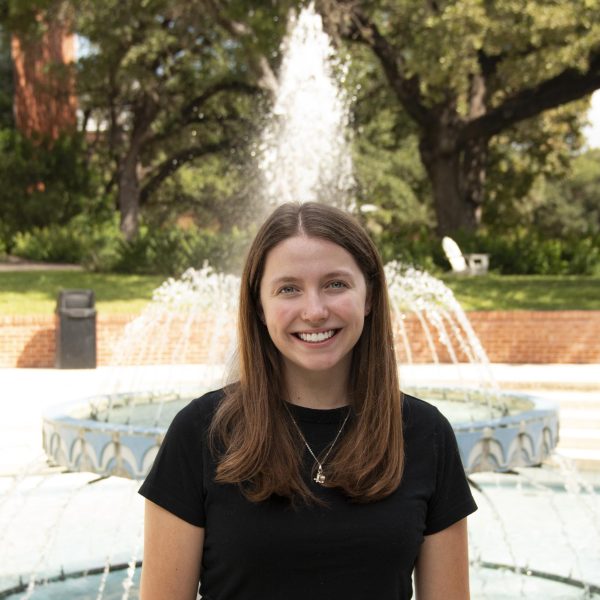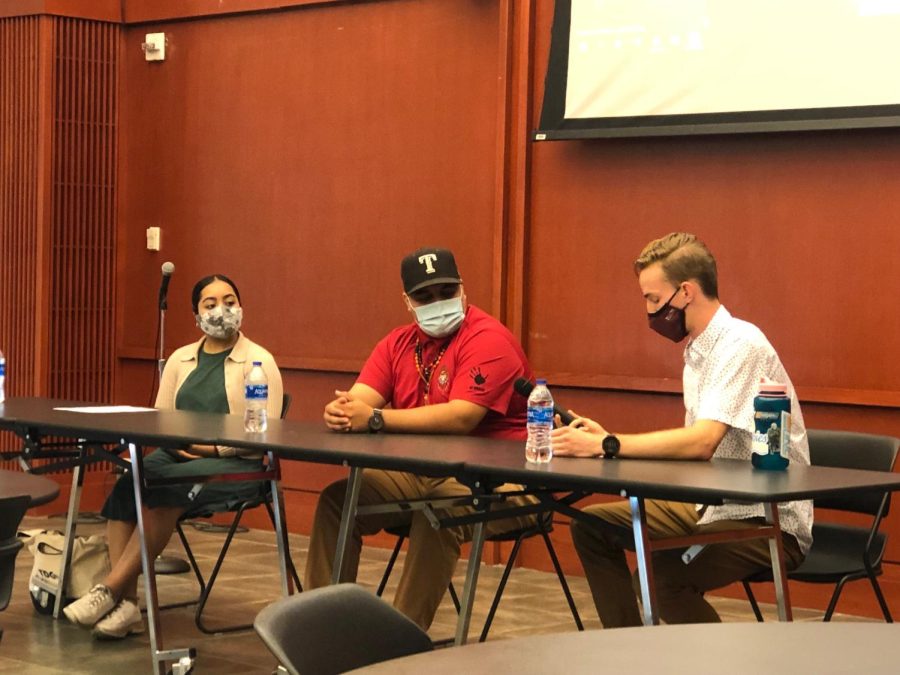Trinity’s Indigenous People’s Club and Land Acknowledgement Alliance strive for representation, visibility on campus
Campus organizations promote diversity and accountability
Photo provided by Nathan Brown
Jahnavi Nikkam (left), Ramon D Vasquez of American Indians in Texas at the Spanish Colonial Missions (center) and Nathan Brown (right) discuss the need for a land acknowledgement at an event last fall.
Trinity’s Indigenous People’s Club (IPC) was active during the 2019-2020 school year but somewhat disbanded when nearly all officers and members graduated. However, Nathan Brown, senior anthropology major, and Gabe Mello, senior history major, have revived the IPC this year along with some other students. Mello and Brown, along with said students, also started the Land Acknowledgement Alliance (LAA) this year. The LAA’s goal is to get Trinity to properly acknowledge the history it is part of and of the Indigenous people who once inhabited the Coahuiltecan, Tonkawa, and Jumano land that Trinity is built on.
While the IPC and LAA are two separate clubs, they are intimately connected, and there is a lot of overlap between members. The previous members of the IPC made some strides with land acknowledgments’ role on campus, but the LAA was not a formal club at the time. For example, both the anthropology and sociology departments on campus have a land acknowledgment for Trinity included in all of their syllabi, but this was an initiative performed by the previous members of the IPC.
After the IPC grew smaller and went inactive during the COVID-19 pandemic, some students felt its loss on campus—Adam Kingery, first-year anthropology and chemistry major, especially.
“I’m a member of the Chickahominy Indian Tribe Eastern Division, and […] it was my intention to join the IPC when I first came to Trinity, and I was disappointed when I couldn’t because it didn’t exist anymore,” Kingery said.
Brown and Mello revived the IPC along with Kingery, Jahnavi Nikkam, senior international studies and sociology major, and Blaine Martin, first-year international studies and political science major. Because Brown, Mello and Nikkam are graduating soon, Kingery and Martin will be the ones leading the IPC next fall.
The revived IPC wanted to bring back the work previously performed by those who graduated by forming the LAA and working in partnership with faculty, staff and outside tribes in the San Antonio area.
Mello, who is also a member of the LAA, said that when the LAA started, members of the club began to think about what more they could do to support Native Americans.
“We wanted the initiative to go beyond the land acknowledgment…There are other long-term goals that we have that need to be spearheaded by a larger organization that has different subsections [that will be] devoted to different aspects of it all,” Martin said.
Brown said that Trinity’s response to the Black Lives Matter protests that took place in the summer of 2020 has given the above-mentioned members of the IPC and the LAA an additional reason to really focus on the land acknowledgment.
“Declarations of support for students and employees of color… those are really great statements and I think this work has been really saying ‘Okay, now it’s time to put your money where your mouth is’ … in a nice way, but at the same time… let’s actually do something,” he said. “Part of this work has been to hold the university accountable and promote visibility and safety for Native students and faculty on campus.”
Martin said that members of the IPC and LAA work to make the efforts of the organizations not just performative, but actually instituting change at Trinity. Brown also added that these organizations provide a space where non-Native students can be advocates and help promote visibility for Native American culture on campus and in San Antonio.
“I would say that there is an end goal, but it’s like a continuous end goal of representing the Indigenous student body and community on Trinity campus… we will consider it a success if we can get to that point, but also once we get there, we need to continue to impact,” Kingery said.
Kingery also said that one of the IPC’s upcoming goals is increasing outreach so that the club will always have a member base. The IPC was just granted approval to become an official student organization, so meetings will begin to be held shortly.
While the IPC is open to everyone, the goal is for the LAA to be led by Native students as much as possible.
“Please get involved… I think with the [IPC], great things are coming,” Brown said.

Hi! My name is Lauren Roddis (she/her/hers), and I am the Pulse section editor! I am a senior from Spokane, WA, studying communication and political science....





